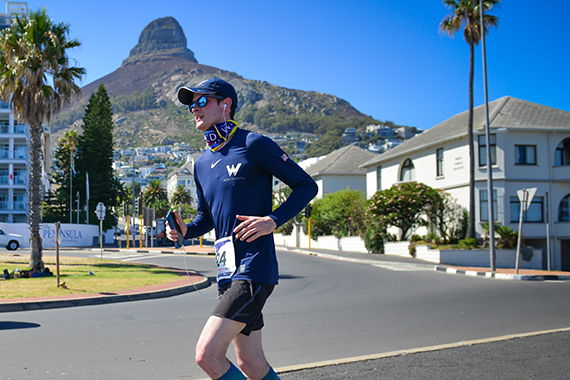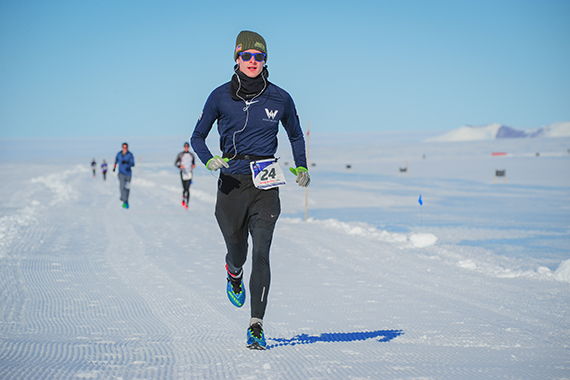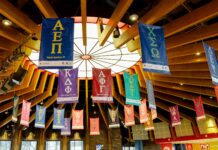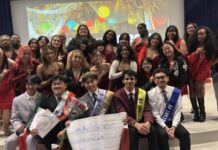Seven marathons in seven days. One on each of the seven continents.
Yes, you read that correctly. It may seem impossible, if not crazy, but Delta Upsilon brother Greg Nance, Chicago ’11, took marathon running to the extreme when he participated in the World Marathon Challenge in February 2019. However, if you knew Greg, you wouldn’t be surprised. In everything he does, Greg pushes himself. Whether it is running or his career, his passion, enthusiasm and determination propel him to go the distance.
The World Marathon Challenge, sponsored by Global Running Adventures, is a wild event. And according to Greg, so are the participants. “You have to be a little crazy to even sign up for this,” he laughed. Both the race logistics and the athletic feat are marvels.
Over a seven-day period, participants run 183 miles and spend about 68 hours on a plane. A private, Boeing 757 airplane takes the runners, race crew, a doctor and the official photographer from location to location. There is little time between landing and running. Then, once everyone has crossed the finish line, it’s pack up and head to the next location. With a limited number of runners—only 42 in 2019—it’s too small of a group to justify shutting down main city thoroughfares for a more traditional marathon route. So, abbreviated courses are created, and runners are tasked with running it in laps until they reach 26.2 miles.
“Every one of these courses was basically a scenic, picturesque part of the downtown area, then it’s usually a variety of laps,” Greg said. “Anywhere between as little as two miles in Australia and Dubai, and then as many as five miles, which we had in Miami. It’s basically laps around a beautiful place.”
For Greg’s first race in Antarctica, he and other runners lapped their plane and a former Soviet research station. Race five took place on a Formula 1 racetrack in Madrid, Spain, while the rest were more traditional road courses. In order, the challenge took runners to Novo (Antarctica), Cape Town (Africa), Perth (Australia), Dubai (Asia), Madrid (Europe), Santiago (South America) and Miami (North America).
As a long-distance runner, Greg had run ultramarathons before, so, to him, the idea of seven marathons in seven days was not totally unbelievable. Previously, he had run the United Kingdom coast-to-coast, 124 miles of Malaysian highlands, 100 miles of Philippine jungle and 155 miles through the Gobi Desert. However, the new challenges with this race were the temperature and terrain changes, as well as the travel. Never before during his ultramarathons did he have to sleep, eat, hydrate, stretch and prepare his body for another long run on an airplane.
“Even under the best of circumstances, that’s a really tough element,” Greg said. “Every one of us, you’re feeling it.”
And Greg was perhaps “feeling it” more than most. While it’s unimaginable to run seven marathons in seven days to most people, try adding the stomach flu on top of it. During the race in Antarctica, Greg was feeling great; adrenaline was flowing as he ran toe-to-toe with some world-class athletes. Of the field of 42, Greg finished that marathon seventh, exceeding his expectations. However, it was on the plane to marathon No. 2, that Greg’s rest and recuperation hit a speed bump.

“As we’re beginning to approach Cape Town, I wake up, and I’m in a cold sweat,” Greg recalled. “Whoa. That’s not what you want to be feeling right now. And actually, I’m feeling my forehead. I’ve got a fever. I’m trying to wash my face, trying to quickly rehydrate as we’re landing in Cape Town, which is 100 degrees hotter than Antarctica.”
The stomach flu would stick with Greg throughout the rest of the Challenge. An illness that would normally take two or three days to recover from stayed around much longer. There is no time to rest and recover when you still have marathons to run.
Greg knew he had prepared himself well for the Challenge. He had trained for the distance, the extreme heat, extreme cold and terrain. This training would help him physically as he battled this flu. Now he needed to focus on the task at hand, ensure his body was as ready as it could be, and rely on his mindset and determination to finish. No longer in his head were dreams of fighting for a spot in the Top 5 or a place on a podium. It was now about survival.
“And that became sort of the rallying cry to try to get pumped up on that, Greg said. “Look one step in front of the next. Next checkpoint. Try to keep moving.”
Greg has been running since he was a child growing up near Seattle. His father, Michael, was a runner and outdoor enthusiast, so it was natural that Greg and his siblings inherited that love. In high school, Greg was part of a competitive mile relay team. Then after college, he picked up marathon running and, eventually, mountaineering, trail running and ultramarathons. In fall 2018, he even convinced Michael to join him for a 250-kilometer run across the Atacama Desert in Chile.
So, it was no surprise to Greg’s parents when he told them about the World Marathon Challenge. They knew he had the stamina and will to complete the Challenge and monitored his progress on Facebook. However, race by race, they could see Greg was struggling. In photos, they could tell Greg was ill—looking pale, tired and underweight.
Before his parents joined him in Miami for the last marathon, Greg relied on a network of friends and strangers to get him through. He was having trouble keeping food down while on the plane, so in Australia, a close childhood friend now living in Perth brought Greg all his favorite snacks. In Madrid—the toughest of the marathons in Greg’s mind—a group of middle and elementary school students flooded him with messages of encouragement. He had just connected with the students through the National Geographic Explorer program, and they were sending him photos of handmade signs, saying things like “Keep Going” and “You can do this, Greg!” Even on the course, Greg was getting encouragement and tips from his competitors.
“I think there’s something special about the group of folks,” Greg said. “When you’re out there, you know how much hard work it’s taken to get to that start line. And when you see someone really in trouble and hurting, there’s a lot of empathy there I think, and it’s beautiful.”
In the final marathon of the Challenge, Greg’s parents literally joined him in the race. Knowing Greg was still battling the flu, Michael offered to pace for him. So, for the third and fourth laps (nearly 11 miles) of the five-lap course, Michael ran with Greg to keep him focused, motivated and steady.
“Amazingly, he got stronger as we ran along,” Michael recalled. “Toward the end of my involvement, he found his stride and began to outrun me. I was no longer any help as a pacer and could only wave him on. I returned to the finish line where my wife and I joined him again for the ceremonial final 200 meters of the run.”
As a college student at the University of Chicago, Greg would run around campus and the surrounding neighborhood. Situated on the south side of Chicago, these runs took him through some of the roughest parts of town. As he would run, he would see kids on the street, sometimes drinking alcohol or selling drugs on the corner, and contemplate the reasons why his life and theirs were so different.
“It’s really not because of any differences of intelligence or character or virtue,” Greg said. “It’s very much our environments.”
From these runs, Greg’s passion for education access and equality began. In his sophomore year, Greg and two friends began their own organization, Moneythink, to help address the problem. Funded in part by a campus investment fund, Moneythink’s initial goal was to get student volunteers in high school classrooms to help them with financial literacy and to serve as mentors. Greg used his DU connections to get Chicago Chapter brothers to volunteer and raise money, as well as open Moneythink chapters on other campuses. This was an integral part of the reason Greg was named Delta Upsilon’s Distinguished Undergraduate at the 2011 Leadership Institute.
“All of our early mentors were Greg’s DU brothers,” said Shashin Chokshi, Greg’s close friend and Moneythink cofounder. “I would say more than 60 percent of the mentors were DUs, and the rest came from across the student population.”
After graduation, Greg went on to the University of Cambridge in London for graduate school but stayed involved with Moneythink. From afar, he helped Shashin and their other cofounder, Ted Gonder, transition Moneythink into a more technology-based platform. Today, the organization is a registered 501(c)3 nonprofit that provides financial coaching for students looking to go to college. From their phones, students can connect with mentors who share resources, give advice, and help them navigate things like the FAFSA and financial aid process. Moneythink chapters also still exist in 30 cities across the United States.
“We tell students, ‘Dream big. You can do it. And the only limits that matter are those that you accept for yourself. So be unlimited. Go for it,’” Greg said.
That same message has led Greg to a second venture, Dyad, which has a similar mission to Moneythink but takes education access to the international level. Now living in Shanghai, China as the CEO of Dyad, Greg and his team look for emerging markets around the world, as well as those from at-risk backgrounds, and help people further their education. As a for-profit social enterprise, Dyad has generated $27 million in scholarships worldwide for the students it serves.
Fittingly, since the idea for Moneythink was born from running around Chicago, furthering the organization was also a factor Greg’s decision to run the World Marathon Challenge. By taking on the Challenge, Greg wanted to be a living example to students of working hard to achieve the impossible. He also wanted to use the event and the platform that came with it to spread awareness for Moneythink. Greg understands that the more people know about Moneythink and Dyad, the more they can drive access to education for those across the globe.
“My passion is education access,” Greg said. “I don’t think your financial situation should ever determine your capacity to be educated and to prepare yourself for the future.”
According to his friends and family, much of Greg’s success comes from him not being afraid to fail. It leads him to set lofty goals and never stop trying to achieve them. Shashin has seen this in Greg’s determination to start Moneythink and watch it grow over the past decade. Greg’s parents have seen it in many ways, including Greg’s fight to finish seven marathons in seven days with the stomach flu.
“Greg’s entire life is like an ultramarathon, and I think he uses that for how he thinks about everything,” Shashin said. “You know that if he is setting himself to do something, he’s going to do it. Even if you think it is impossible to do. But he’s going to do it, one step at a time, for a really long time.”
Afterall, you can’t run any marathons—let alone 183 miles—without taking that first step.
All photos © Mark Conlon/World Marathon Challenge






















